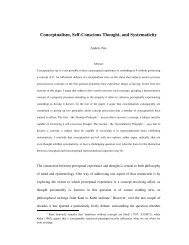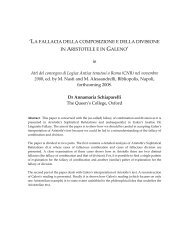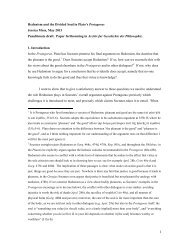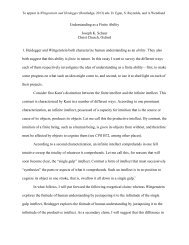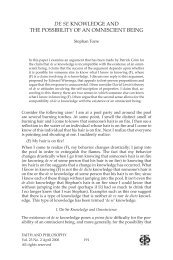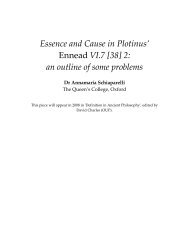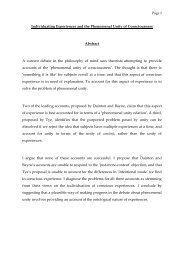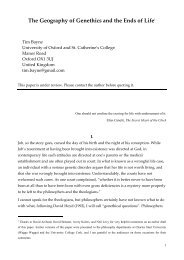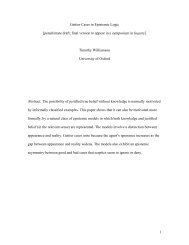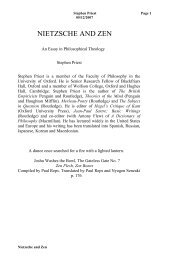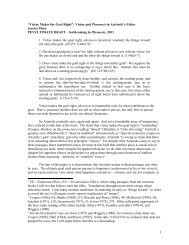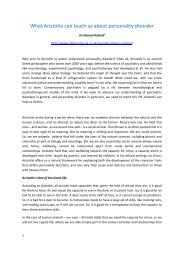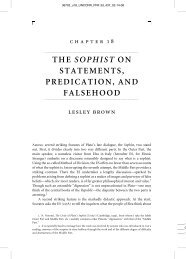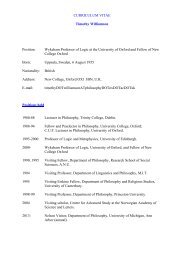Between Saying and Doing: Towards an Analytic Pragmatism
Between Saying and Doing: Towards an Analytic Pragmatism
Between Saying and Doing: Towards an Analytic Pragmatism
Create successful ePaper yourself
Turn your PDF publications into a flip-book with our unique Google optimized e-Paper software.
Br<strong><strong>an</strong>d</strong>om<br />
different kinds of automata c<strong>an</strong> compute, ever larger classes of vocabularies. Context-free<br />
vocabularies that are not regular require more powerful grammars to specify them, as well as<br />
more powerful automata to deploy them. 22<br />
FSAs are special kinds of PDAs, <strong><strong>an</strong>d</strong> all the<br />
automata are special kinds of Turing Machines. Recursively enumerable vocabularies are not in<br />
general syntactically reducible to context-sensitive, context-free, or regular ones. And the less<br />
capable automata c<strong>an</strong>not read <strong><strong>an</strong>d</strong> write the all the vocabularies that c<strong>an</strong> be read <strong><strong>an</strong>d</strong> written by<br />
Turing Machines.<br />
Nonetheless, if we look at pragmatically mediated relations between these syntactically<br />
characterized vocabularies, we find that they make possible a kind of strict expressive<br />
bootstrapping that permits us in a certain sense to evade the strict restrictions on expressive<br />
power enforced for purely syntactic relations between vocabularies. The hierarchy dictates that<br />
only the abilities codified in Turing Machines—two-stack push-down automata—are PVsufficient<br />
to deploy recursively enumerable vocabularies in general. But now we c<strong>an</strong> ask: what<br />
class of l<strong>an</strong>guages is VP-sufficient to specify Turing Machines, <strong><strong>an</strong>d</strong> hence to serve as sufficient<br />
pragmatic metavocabularies for recursively enumerable vocabularies in general? The surprising<br />
fact is that the abilities codified in Turing Machines—the abilities to recognize <strong><strong>an</strong>d</strong> produce<br />
recursively enumerable vocabularies—c<strong>an</strong> quite generally be specified in context-free<br />
vocabularies. It is demonstrable that context-free l<strong>an</strong>guages are strictly weaker in syntactic<br />
expressive resources th<strong>an</strong> recursively enumerable l<strong>an</strong>guages. The push-down automata that c<strong>an</strong><br />
read <strong><strong>an</strong>d</strong> write only context-free l<strong>an</strong>guages c<strong>an</strong>not read <strong><strong>an</strong>d</strong> write recursively enumerable<br />
22<br />
Regular l<strong>an</strong>guages are those that c<strong>an</strong> be specified entirely by production rules of the form: AaB <strong><strong>an</strong>d</strong> Aa.<br />
Context-free l<strong>an</strong>guages relax these restrictions, allowing production rules of the form: A.<br />
LL1 Text.rtf 30 11/8/2007



